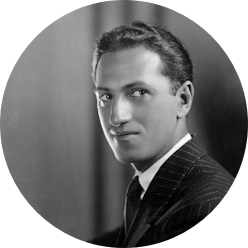
George Gershwin
September 26, 1898 - New York (USA) — July 11, 1937 - Hollywood (USA)
About
Gershwin, internationally renowned for his Rhapsody in Blue, greatly impersonated the American dream. Son of immigrants, an autodidact from a modest background, the young composer climbed the rungs to success in order to make a name for himself in the world of his so-called "serious music": in Broadway shows and Hollywood musicals. To start with, Gershwin was a remarkable pianist and was noticed for his virtuoso interpretations of ragtime in music shops.
While discovering works by Debussy, Ravel and Schoenberg, Gershwin met Irving Berlin, the most famous composer in Broadway, who commissioned him to make arrangements for his musical comedies. Success was quick to follow with the reviews of La, La, Lucille (1927) and his songs for the first talking film, the Jazz Singer (1927).
Anxious to surpass these aesthetics and cross over new horizons, Gershwin sought lessons from Nadia Boulanger, Edgar Varese and Maurice Ravel. Each refused, arguing that he was already an accomplished composer. In constant pursuit of his fanciful idea to compose so-called "serious music", Gershwin became, as a result, a marvellous ferryman between different styles. Gershwin’s traditional melodies, operettas, music hall, ragtime, blues, jazz, concertos, operas and symphonies cannot be classified and remain famous for the liberty of their tone.

